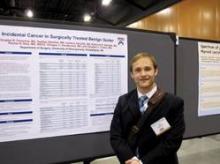PHOENIX – More than one-fourth of men under age 50 undergoing surgery for benign goiter were found to have thyroid cancers, based on a chart review performed at the University of Pennsylvania.
The overall incidence of thyroid cancers in the patient series was 12%. Among men under age 45, the rate was "surprisingly" 28%, said Douglas R. Farquhar, a medical student at the University of Pennsylvania School of Medicine in Philadelphia.
Although thyroid goiters have traditionally been thought to be associated with a low risk for malignancy, recent studies have suggested otherwise. "In the literature we have seen published rates of up to 35%, which is much higher than we all had anticipated," Mr. Farquhar said at the annual Society of Surgical Oncology Cancer Symposium.
To get a better handle on the preoperative and patient characteristics associated with incident thyroid cancer and characterize the types of thyroid cancer discovered incidentally, Mr. Farquhar and his colleagues reviewed charts on all patients who underwent either total thyroidectomy or thyroid lobectomy for goiter at the center from 2004 through 2012.
Many cases of goiter can be medically managed, but surgery may be indicated in cases of pressure symptoms, cosmesis, or suspicion of malignancy, the investigators noted.
They excluded from their study patients with preoperative fine-needle aspiration pathology findings of Bethesda level III-VI (follicular lesion of undetermined significance, follicular neoplasm, suspicious or positive for malignancy).
Among 418 patients undergoing goiter surgery, 367 had goiter only, and 51 (12%) had an incident thyroid cancer. In all, 38 (75%) had papillary carcinomas, 10 (20%) had follicular carcinomas, 3 (6%) had Hürthle cell carcinomas, and 2 (4%) had thyroid lymphomas (two patients had multiple thyroid cancers, explaining the percentage greater than 100). An additional 67 patients (16%) were found to have micropapillary lesions.
Looking at the population as a whole, the investigators found that patients with thyroid cancer tended to be younger, with a mean age of 49.5 vs. 54.6 years (P = .012). There was a trend toward more cancers among men than women, but it was not significant.
There were no significant differences in any preoperative factors between patients with cancers and those with goiter only, including number of nodules, site of dominant nodule (right, left, or isthmus), thyroid function, thyroid weight, or fine-needle aspiration results (percentage deemed benign or nondiagnostic).
In a multivariate analysis, male sex was associated with a more than twofold risk for thyroid cancer (odds ratio, 2.39; 95% confidence interval, 1.152-4.978). There were also trends toward a lower risk of cancer with each additional decade of life, and a higher risk among patients who had undergone thyroid lobectomy, but these were nonsignificant associations.
"Knowledge of these associations may prove to be useful for both patient counseling and surgical decision making," Mr. Farquhar said.
The study was internally funded. The senior author was Dr. Douglas L. Fraker, chief of the division of endocrine and oncologic surgery at the University of Pennsylvania.
Mr. Farquhar and his coauthors reported having no relevant financial disclosures.


